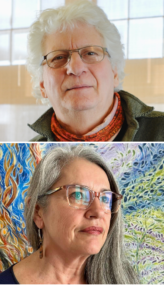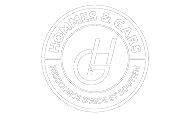A Place of Convergence for Change and Wellness
 “Every time we help a man, we help his children and his partner. It’s positive for society as a whole,” stated Marie Hudon, Assistant Executive Director of Convergence – Service d’aide aux hommes de la Gaspésie, accompanied by Jean-Jacques Élie, the organization’s counselor and Executive Director. Since its foundation, Convergence has been committed to its mission of helping the male population of the Gaspé Peninsula. Men and teenagers aged 16 and over are welcome at this organization, where they are welcomed, their needs analyzed, and non-judgement is practiced. In 12 years, nearly 2,500 different men have found help from Convergence’s team of counsellors. What services do we offer? And what tips should we know to improve our relationships with our loved ones? We met Jean-Jacques and Marie to find out.
“Every time we help a man, we help his children and his partner. It’s positive for society as a whole,” stated Marie Hudon, Assistant Executive Director of Convergence – Service d’aide aux hommes de la Gaspésie, accompanied by Jean-Jacques Élie, the organization’s counselor and Executive Director. Since its foundation, Convergence has been committed to its mission of helping the male population of the Gaspé Peninsula. Men and teenagers aged 16 and over are welcome at this organization, where they are welcomed, their needs analyzed, and non-judgement is practiced. In 12 years, nearly 2,500 different men have found help from Convergence’s team of counsellors. What services do we offer? And what tips should we know to improve our relationships with our loved ones? We met Jean-Jacques and Marie to find out.
Where Does Convergence Come From?
“The name Convergence is intended to express a meeting place for men, a space for sharing and exploration with the aim of developing communication and assertiveness skills without violence,” as stated on the organization’s website. Why was it created? To meet the needs of men in the community, explained Jean-Jacques.
“Initially, when Convergence was created in 2011, its mandate was to intervene in domestic violence. Since we were the only organization specifically dedicated to men in Gaspésie, over the years we’ve also developed other services, particularly to help men in difficulty. These could be men who have gone through a break-up, for example,” explained Jean-Jacques, adding that a majority of participants come for help following a separation.
Other services have been added, including: “We realized that a good proportion of our participants were fathers, hence the idea, which came to us in 2015, of opening a Maison Oxygène to improve our services for fathers,” continued the General Director. Maison Oxygène Haute-Gaspésie, which opened in 2021, offers accommodation to fathers in difficulty “to consolidate the father-child bond and enhance the father’s role,” explained Marie, who is also the home’s director.
Helping Men and Changing Society
Convergence helps men who are experiencing difficulties, fathers, as well as spouses with violent behavior, whether physical, verbal or otherwise. Why is it important to offer help to these men? “It’s essential. That’s how our society will evolve,” replied Jean-Jacques. For him, helping men who behave violently is part of the solution to the problem of domestic violence. This is also Marie’s view. “I believe in it deeply. Getting help can make a difference, even save lives,” she explained.
How does the Convergence teamwork with men who behave violently? “We totally adhere to the values and vision of the member organizations of the à cœur d’homme network, which obviously focus on stopping violent behavior. We work with the participant to deconstruct his denial, dispel his justifications, and begin the process of taking responsibility. Obviously, he has homework to do, using tools that will enable him to change his attitudes and behaviors. We help them to reflect on their preconceived ideas, often associated with gender stereotypes that are not conducive to establishing and maintaining egalitarian relationships. Because there’s also the whole notion of respect when we talk about equal relationships. We work a lot on that,” explained Jean-Jacques. At Convergence, we believe in people’s ability to change. We make the distinction between people and their behavior, while making them understand that they are responsible for their actions. We give them the tools to learn non-violent solutions and change their behavior in order to establish healthy family relationships.
Time Out: Improving Relationships
What kind of tools are offered to participants? Marie and Jean-Jacques talked about Time-Out. It’s presented to participants to help them avoid violent episodes, but it can also be useful for many people who want to improve their relationships with their loved ones.
During conflicts, do you sometimes say things that go beyond your thoughts? Do you sometimes make gestures that you later regret? Do you sometimes feel impulsive? “During heated exchanges, do you feel misunderstood, unheard, frustrated and angry? Are you going round in circles and about to explode? You can prevent these power surges by taking a look at your emotional map,” explained Jean-Jacques.
How does the Time-Out tool work? In short, the first step is to learn to recognize your own warning signals that tell you that you’re starting to feel negative emotions such as anger. You also need to pay attention to “your physical symptoms. Sometimes it can be palpitations, a tightness in the throat, hot flashes, sweating,” explained Marie. These physical signs are accompanied by psychological ones. You feel less and less able to act calmly, you feel frustration building up, and you feel you could explode. When we recognize our warning signals, for example during a conversation with our partner or a friend, we need to “change our tune.” But above all, we need to signal our intention,” explained Jean-Jacques. For example: “Listen Marie-Julie, I’m really not feeling well, I need to stop this discussion, please,” he continued.
What happens next? Stay out of the room or building for an hour and do some physical activity, such as walking, running, or breathing. “Above all, don’t take a motorized vehicle, and avoid using tools that could injure you. We keep in touch with ourselves,” says Marie. When you feel the tension easing, you calmly reflect on the situation. Then you can come back to the person to see if he or she agrees to resume the discussion. Talk about yourself in the first person. Listen carefully to the other person’s point of view. “We talk about our needs and our limits, avoiding putting them in opposition to those of the other person. It’s also important to see how each person has interpreted the situation,” explained Jean-Jacques. Then we come up with a joint solution. It’s impressive how this process can help defuse disputes.
However, “don’t use Time-Out in the middle of a dispute because it can easily add fuel to the fire!” explained Jean-Jacques.
This video (in Fench) from the à cœur d’homme network summarizes the tool. You can also contact Convergence for a more detailed explanation of Time-Out.
For Men’s Health and Well-Being
In conclusion, with 6 service outlets in Gaspé, Chandler, Caplan, Carleton-sur-Mer, Pointe-à-la-Croix, and Sainte-Anne-des-Monts (head office and Maison Oxygène Haute-Gaspésie), Convergence is there to help men in need. The organization is even working to expand and adapt its services to better serve the region’s English-speaking and indigenous communities. We are committed to men’s health and well-being and offer confidential services that can make a real difference to your life. So, if you need help, don’t hesitate. Asking for help is powerful!









